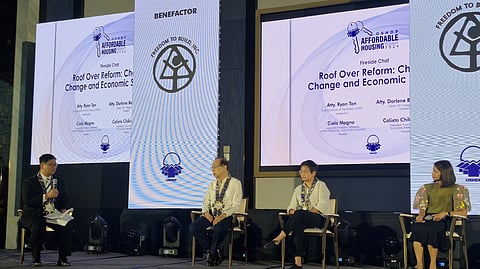
- NEWS
- the EDIT
- COMMENTARY
- BUSINESS
- LIFE
- SHOW
- ACTION
- GLOBAL GOALS
- SNAPS
- DYARYO TIRADA
- MORE

Taken from its theme, "Breaking Barriers: Revolutionizing the Philippine Housing Industry." The Affordable Housing Summit 2024, bridged everyone in the housing industry to take part in the Organization of Socialized and economic Housing Developers of the Philippines or (OSHDP)s' advocacy, to make housing available to every Filipino family and to treat having a home as necessity rather than just a commodity.
With four breakout sessions that tackled socialized housing, labor in construction, the Philippine roadmap to education, and public-private initiatives for addressing housing backlogs, one thing was always at the forefront: innovation.
From the Philippine Constructors Association, Dr. Ernie De Castro; "This is something that we have to do and it is much worse for the construction industry, specifically because the construction industry is the last to adapt." He discussed the availability of innovative construction tools; but noted that the high turnover of skilled workers and the low inclination of the younger generation for construction jobs are among the challenges the industry faces.
Meanwhile, Coliers Director for Advisory services, Karla Domingo suggested "Looking at second-tier cities and see how you can make your projects affordable." She emphasized shifting the mindset from non-existent demand to creating supply where affordable housing demand will follow. This approach could address the housing backlog, where the vital subject of discussion is the financial capabilities of interested homeowners who are unable to pursue due to the high cost of land and construction.
"How much of your income can be allocated for housing?" Dr. Marife Ballesteros of the Philippine Institute for Development Studies, President and CEO of the Philippine Guarantee Corporation, notes the concerns of lower-income families, who must budget their resources to prioritize necessities such as food, healthcare, and utilities, often leaving homeownership to those with disposable income.
Prof. Joshua Bolchover, Director for Architecture at the Research Laboratory of Hong Kong University, stressed that "The world's climatic future hinges on how developing nations grow." Much like the renowned resilience of Filipinos, the design and construction of Filipino homes should reflect its capability to withstand natural disasters that our country may came across. Not just to survive calamities but to pass on these homes to future generations.
Senator Imee Marcos was represented by her cousin, Eliza Romualdez-Valtos, who delivered her keynote message, where she shared the bills and resolutions she passed in relation to the improvement of the government's housing projects. Senator Marcos also recalled her father's dream of making decent housing affordable for Filipinos.
Is the Philippines ready for Charter Change?
The 1987 Constitution's outdated provisions were a hot topic during the summit's fireside chat session. "Opening up the door will really result in investments," argued Calixto Chikiamco, President of the Foundation for Economic Freedom Inc. He suggested that removing the restrictions on land ownership for foreign investors could lead to economic progress, similar to Vietnam's.
Atty. Darlene Berberabe, Dean of the University of the Philippines, College of Law, discussed public sentiment whenever charter change is brought up. "The issues then were muddled. It was presented that the charter was intended to change, specifically the economic provisions. But then there was a lot of talk as well, that there was an underlying motive that it is actually the political provisions that will be impacted." The suppose "muddling" of the charter change showed that the Philippines is not yet ready for this reform.
The future of the Philippines: Charter Change
"This will happen not because of economic reasons, not because of urgency, but because it will serve somebody's political agenda," stated University of the Philippines, School of Economics Associate Prof. Cielo Magno. While charter change is bound to happen, hopefully it will support economic progress and bring in more foreign investors, so we can mobilize capital and eventually the government can provide a higher allocation of funding for housing development.
